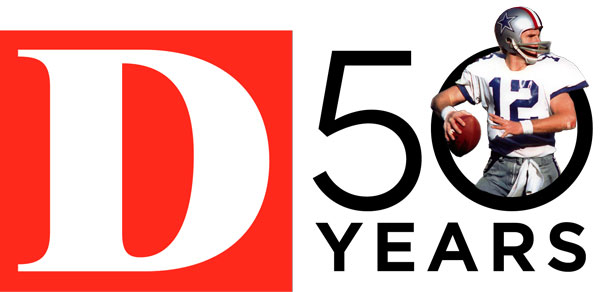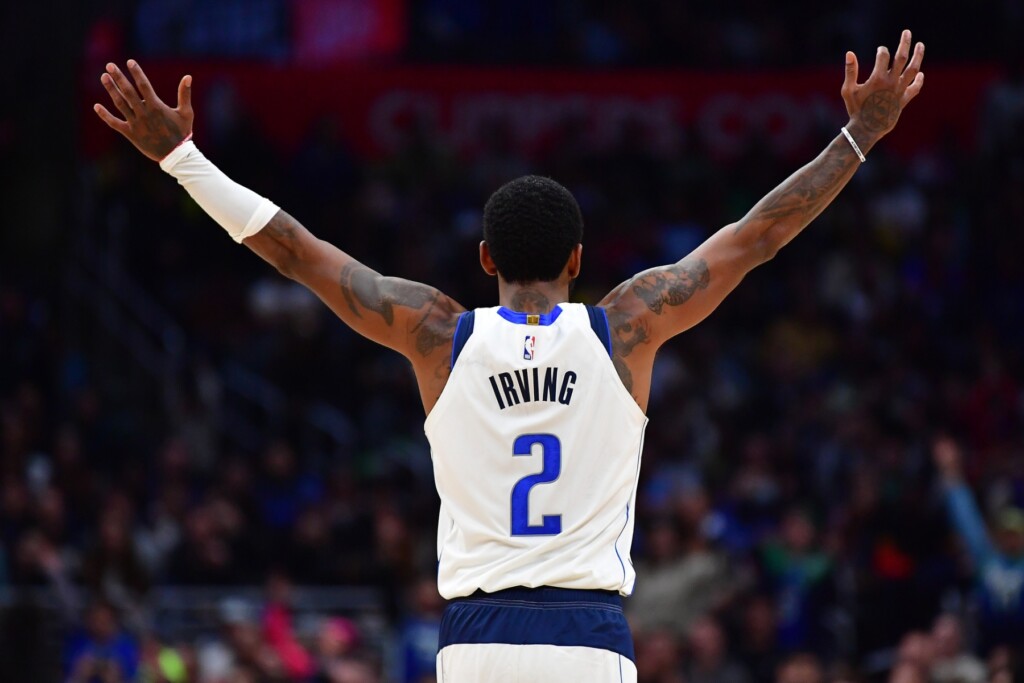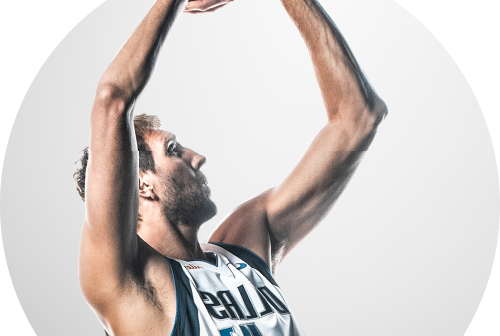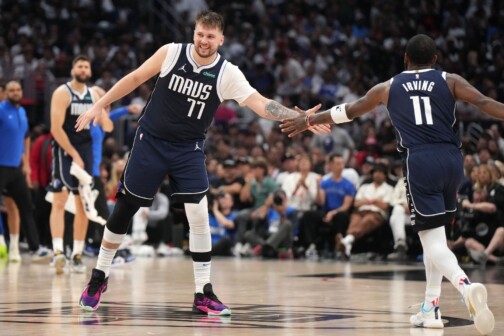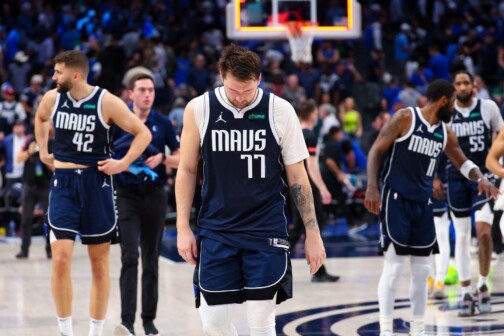Mavericks playoff basketball is back!
After the disappointment of last season, the Mavericks turned things around with a 50-win season, a significant mid-season makeover, and a late run that clinched the fifth spot in the Western Conference. Now, in their sixth playoff appearance since drafting Luka Doncic, they’re facing a familiar foe for the third time: the Los Angeles Clippers.
In their first two encounters, the Mavericks were like the younger brother struggling against a bigger, tougher, older sibling. But they have grown up and bulked up, leveling the playing field against the team that twice ended their season. The term “evenly balanced” aptly describes the competition between teams with the fifth- and sixth-best records in the NBA, separated by only one win. Here are more numbers to underscore just how closely matched these teams are: as of April 10—excluding the last two games of the season where key players were rested—the Clippers and Mavericks ranked seventh and ninth in point differential, third and sixth in offense, and 14th and 15th in defense, respectively, according to Cleaning the Glass. It’s not only the numbers that are similar. This series will be a clash of teams that rely heavily on the offensive brilliance of their superstars. Doncic, Kyrie Irving, Kawhi Leonard, Paul George, James Harden, and Russell Westbrook bring a combined 47 All-Star selections to the matchup.
And although the playing styles of the superstars differ, their processes and end results are strikingly similar. Both teams rely on the brilliance of two of the best pick-and-roll manipulators in recent history—Doncic and Harden—as well as matchup-hunting, which allows their stars to excel in one-on-one scoring situations. How much individual brilliance and fireworks can we expect? A ton. The Clippers and Mavericks rank first and second in the NBA in isolation frequency. Moreover, Doncic, Irving, Harden, Leonard, and George all rank among the top eight in isolation efficiency for players with more than 400 such possessions, according to Second Spectrum tracking data. The similarities run even deeper. Both teams look unstoppable when their superstars play, each scoring at an elite rate of 122.5 points per 100 possessions when their stars are on the floor. The Mavericks posted a 35-16 record in games featuring both Doncic and Irving, with lineups including their two superstars boasting a plus-10.4 point differential. Meanwhile, the Clippers went 37-19 when Leonard, George, and Harden were playing, achieving a plus-10.6 point differential. Both teams have a solid big man (in the Mavericks’ case, two) anchoring their defense, but also look comfortable playing small, spreading the floor, and providing even more space for their superstars to perform their magic.
That said, the paths to the playoffs for each team were quite different. After an injury-riddled first part of the season, the Mavericks got healthy and added reinforcements at the trade deadline, finishing the season strong. The Clippers, on the other hand, peaked in December and January, when they were the best team in the NBA. In what seemed like an organizational shift to honor and respect the regular season, Leonard, George, and Harden played more games and minutes than they had in any of the last five seasons. But this heavy load appeared to catch up with the veterans by the end of the season, with the trio all missing games due to nagging injuries. Leonard’s health remains the biggest question mark and source of speculation. The Clippers’ leading scorer, he has been dealing with inflammation in his right knee, an ailment he has battled the past two seasons. However, based on Tyronn Lue’s daily back-and-forth with the media, the Clippers’ coaching staff is preparing as though the soon-to-be 33-year-old will be available for Game 1 on Sunday.
Why the Mavs will win the series
Kyrie Irving
“We have Kai” was Doncic’s response when asked about the biggest difference in this series compared to the previous two. Doncic’s playoff performances against the Clippers have been spectacular; in 13 games, he has averaged 33.5 points, 9.5 assists, and 8.8 rebounds.The Mavericks, however, lacked a co-star anywhere near the caliber of Irving. There was too much pressure on Doncic to create everything from start to finish, which wore him down as the games progressed. His effective field goal percentage dropped from 54 percent in the first halves to 45 percent in the second halves. Doncic now has a sidekick to help him close games, a script we’ve already seen play out several times this season: Luka applies pressure from the jump, methodically dissecting defensive coverages, then Kyrie takes over late in games. Seeing the chemistry between Luka and Kyrie grow with each game has been my highlight of watching the Mavericks, and we can expect even more in the playoffs. With Kyrie’s ability to perform in clutch situations, the Mavericks have another option to go toe-to-toe with Leonard when the game is on the line.
They got bigger, more athletic, and more physical
The Mavericks dropped two of the three games against the Clippers this season, and both losses were due largely to the Clippers being the more physical team. Dwight Powell and Richaun Holmes (remember him?) were the primary options at center, with Dereck Lively II missing two games and Maxi Kleber sitting out all three. Consequently, Jason Kidd often opted for smaller guard-heavy lineups, featuring Grant Williams or even Derrick Jones Jr. at the five. With Daniel Gafford, P.J. Washington, Lively and a healthy Kleber in the mix, the Mavericks will for the first time enter the series as the younger, bigger, and more athletic team. They now have several players capable of making game-altering plays on both ends of the court. Gafford and Lively, in particular, need to use their athleticism to their advantage and put pressure on Ivica Zubac, who is pivotal to the Clippers’ defense, by rolling hard to the rim, with rim runs in transition, and attacking the offensive glass. The Clippers struggled with transition defense in the regular season, ranking third-worst according to Cleaning the Glass, and the younger Mavericks need to expose that.
The defense is legit
This is something I never thought I’d write about the Mavericks: defense has become a strength. The last time they faced the Clippers in the playoffs, it got so bad that Rick Carlisle resorted to playing a zone with Boban Marjanovic and Kristaps Porzingis in the middle, simply because the Mavericks couldn’t get any stops. The Clippers shot 61 percent in the paint in their two playoff matchups. The Mavericks are not the best defensive team in the NBA, as they were for a month following the trade deadline, but I believe their days of being a below-average defense are over. Playing Gafford, Lively, Jones Jr., Washington and Dante Exum over the likes of Powell, Tim Hardaway Jr., Jaden Hardy, and the departed Williams and Seth Curry are legit upgrades, not a gimmick.
The scheme now prioritizes protecting the paint with length and size. In the three matchups against the Clippers this season, the Mavericks allowed 59 points per game on 65 percent shooting in the paint. But this is a much different team since the arrival of Gafford and Washington and the emergence of Lively. Dallas is allowing the lowest opponents’ field goal percentage in the paint in the league since the trade deadline makeover. The Mavericks excel when there are weak links to help off of, and the Clippers have three poor shooters—Zubac, Mann, and Westbrook—among their top seven rotation players. Dallas will most likely sag off of Mann and Westbrook, aiming to prevent easy shots at the rim while showing early help to push Leonard away from deadly pull-up shots in the paint toward less efficient, mid-range attempts. Washington, Jones Jr., and Kleber represent the best combination of size and length the Mavericks have had to throw at Leonard. They won’t stop him, but if they can reduce his two-point shooting percentage from the ridiculous 65 percent he achieved in previous series to the lower 50s, their chances will significantly improve.
They have the flexibility to play big or not-so-small small-ball
Like it or not, one of the teams most likely will resort to using lineups without a traditional big as a counter sooner rather than later. Doncic and Irving will target Zubac in pick-and-roll, potentially forcing Lue to opt for smaller lineups. Likewise, the Clippers will focus on Doncic and Irving defensively, either involving them in pick actions with Harden or isolating them on switches with Leonard and George. This may compel Kidd to integrate another mobile defender into the lineup. The Clippers haven’t utilized lineups without a traditional big extensively, partly because they lack the wing depth of previous seasons. Leonard, George, Amir Coffey, and P.J. Tucker have received the majority of the frontcourt minutes in small-ball lineups, but none of them is taller than 6-foot-8. Even in a small-ball setup, the Mavericks will maintain a size advantage when Kleber and Washington are on the floor. Lineups featuring these two were statistically the Mavericks’ best this season. Playing the more mobile Kleber over a traditional center gives Kidd the option to add a third switchable defender if he’s uncomfortable with Doncic or Irving guarding Harden or George, while providing better spacing on the other end.
Why the Mavs might lose the series
Shooting and punishing help, part I
If there’s one area where the Clippers hold a clear advantage, it’s shooting. Their top four offensive players and the guys who frequently close clutch games—Harden, Leonard, George, and Norman Powell—are all exceptional shooters. The latter three are particularly deadly from beyond the arc, each shooting above 42 percent on catch-and-shoot threes over the last three seasons. Having George and Powell attack defenses that collapse on Harden and Leonard gives the Clippers an almost unfair advantage. George and Powell rank first and fifth, respectively, in efficiency when attacking close-outs among the 183 players with more than 300 such possessions this season. Lineups featuring the Clippers’ big three along with Powell rank among the top offensive units in the NBA and are almost like a cheat code. Rotating and closing out effectively will be the ultimate test for the upgraded Mavericks defense, whether against Harden’s pick-and-rolls or when doubling Leonard or George. Particularly Leonard, which I suspect will happen frequently. Harden will be another swing factor. Watching how the Mavericks apply pressure on his pick-and-roll actions with Zubac, with Jones Jr. and Washington tasked with defending Leonard and George, will be key, especially early in the games. Harden is the streakiest shooter of the group, sometimes hesitant on catch-and-shoot opportunities, but extremely difficult to defend if his step-back three is falling.
Shooting and punishing help, part II
The Mavericks’ ability to punish defensive help is less proven and will face a significant test in this series. The tradeoff at the deadline—opting for length and athleticism over shooting prowess—has greatly enhanced the Mavericks at the defensive end of the floor but it presents challenges on the other end. Key rotation players, including Washington, Kleber, Jones Jr., Exum, and Josh Green, are neither as efficient nor as proven as the Clippers’ main rotation players, nor are they as effective at attacking defensive help.
Much has been discussed about Leonard’s prowess as a lockdown defender who could potentially defend Doncic in key moments, but I believe his off-ball defense—particularly as a low man or weakside defender—will pose a much bigger problem. Expect Kawhi to help aggressively off of Jones Jr., Washington, and other wing players to assist Zubac in managing pick-and-rolls. He might tag the roller in drop coverage or rotate over if they blitz. His ability to disrupt Doncic’s passing angles and still recover will be the Mavericks’ biggest challenge, especially when Dallas fields lineups with poor spacing, featuring three from Gafford, Lively, Jones Jr., and Washington. The good news for the Mavs is that Washington and Kleber’s three-point shooting has been trending upward since the All-Star break, and Exum has drained threes all season. However, the playoffs are a different beast—there will be less time and more pressure to make sound decisions. How the Mavericks’ role players handle this will be crucial.
Ultimately, most playoff series boil down to how the superstars perform. There will be plenty of star power in this series, and the track record shows both teams have been awesome when their star players are available and healthy. Like Doncic, Leonard can be the best player in any series. That’s not a knock on Doncic, but an homage to Kawhi’s dominant playoff performances.
But based on what we’ve seen this season from Doncic and Irving—their chemistry and ability to dominate games in waves—I have greater confidence in the Mavericks’ duo than in Leonard’s health or the playoff performances of George or Harden. That’s why I’m picking the Mavs to win in six or seven games.
Author

